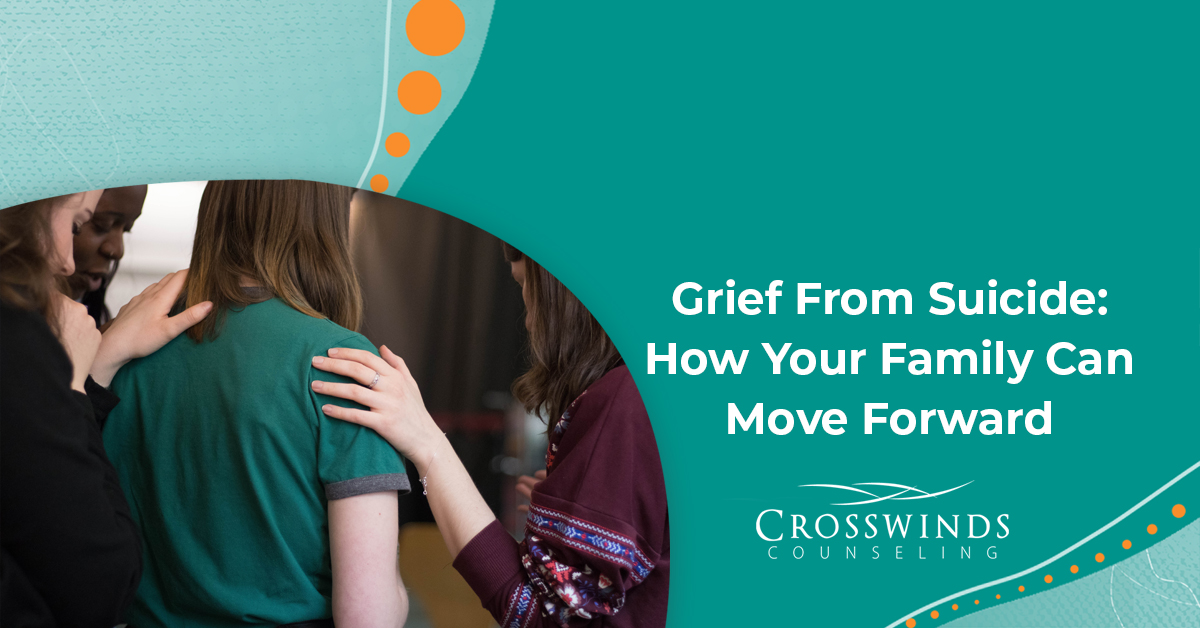
When someone dies by suicide, family and friends are prone to feeling significant bewilderment about the death. They ask questions like, “Why did this happen?” “How did I not see this coming?” The following feelings are normal when dealing with grief from suicide:
- Overwhelming guilt about what they “could or should have done”.
- Self-blame as if somehow they are responsible for their loved one’s suicide.
- Anger toward their loved one for abandoning or rejecting them.
- Disappointment that somehow they were not powerful enough, loved enough, or special enough to prevent the suicide.
These mistaken assumptions can plague survivors and linger for a very long time. Many struggle for years trying to make sense of their loved one’s death, and even longer making peace—if at all—with the unanswerable questions that linger.
When we lose a loved one to illness, old age, or an accident, we can replay fond memories or share stories with joyful nostalgia. With suicide, this is often not the case. Instead, survivors question the memories: “Were they really good?” “Maybe he wasn’t really happy in this picture?” “Why didn’t I see her emotional pain?” It can add to their grief to recall memories, so survivors often divorce themselves from their loved one’s legacy.
Survivors of suicide loss not only experience complicated grief, they are also prone to developing symptoms of depression and post-traumatic stress disorder, a direct result from their loved one’s suicide. The unspeakable sadness about the suicide becomes a circle of never ending incomprehension, pain, flashbacks, and a need to numb the anguish.
As a survivor of suicide loss, you will never get over the loss you’ve experienced, but you can get through it. You have been changed by this loss, but you can learn how to survive – even grow from – this hardship. The following suggestions are healthy ways to help your family move toward healing:
Seek Support
Find people who are good listeners so you can turn to someone when you need extra support. You can talk to a friend, family member, mental health professional, or spiritual adviser. Others find joining a support group helpful.
Be Patient
You may be experiencing a range of emotions and people around you may also be sorting through their feelings. Be patient with yourself and others – those who are supportive of you as well as those who don’t seem to understand. It’s okay to limit your contact with those who tell you how to feel and what to think. Give yourself time to heal.
Stay Present
Take each moment as it comes, in an effort to better accept whatever you’re feeling and be able to respond in the way that is most helpful to you. Maybe you would benefit from calling your best friend or journaling your thoughts. Learning mindfulness techniques can help you stay present and experience your emotions without feeling overwhelmed.
Express Yourself
You can choose to tell others how you’re feeling or deal with your feelings privately. If you don’t feel like talking, you can set aside time each day to grieve – it’s important to create the space you need to be sad. Make sure you leave enough time to do something pleasantly distracting as well.
Allow Yourself to Have Fun
Social events or pleasant activities can provide relaxation and distraction. Laughter heals, it’s okay if you cry, but it’s also okay for you to have fun!
Establish Routine
Even getting dressed may seem challenging at first, but it’s important to reestablish routine as soon as you can. Building in some structure can help you manage your grief and provide a sense of normalcy and hope.
Take Care of Yourself
Eat as well as you can and exercise when possible. Avoid alcohol and other drugs that are an escape and make it harder for you to work through your feelings. Remember, stay present.
“For I am convinced that neither death, nor life, nor angels, nor principalities, nor things present, nor things to come, nor powers, nor height, nor depth, nor any other created thing, will be able to separate us from the love of God, which is in Christ Jesus our Lord.” Romans 8:38-39
This verse in Romans remind us about the promises of God’s love and grace and also give us hope. Not even suicide can separate a believer from the love of God.
Use these tips to help you, your spouse, your children, or other family members deal with their grief if someone close to them dies by suicide. If your family has been affected by the loss of a loved one to suicide, Crosswinds will walk with you during your journey through grief. Call 877.594.9204 or text START to 260.238.8939 to enroll in family counseling today.
